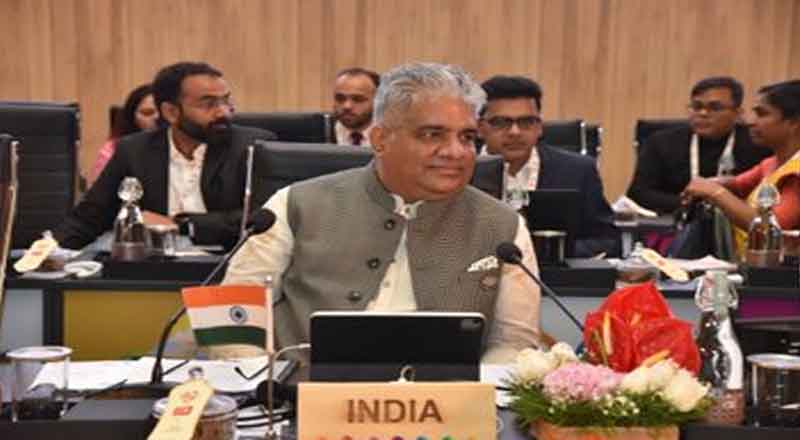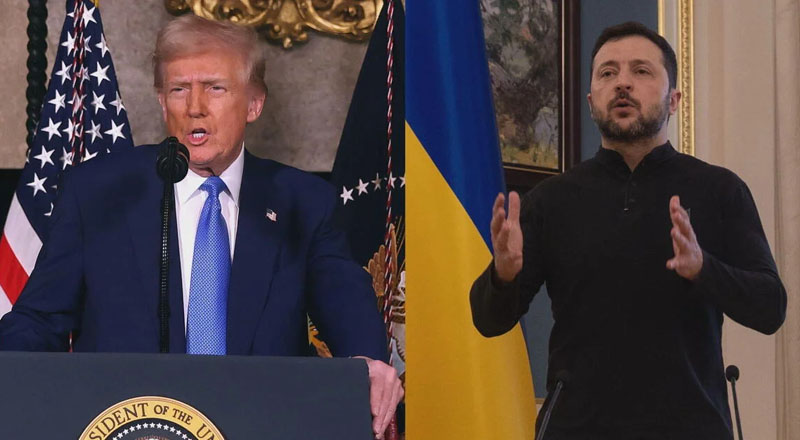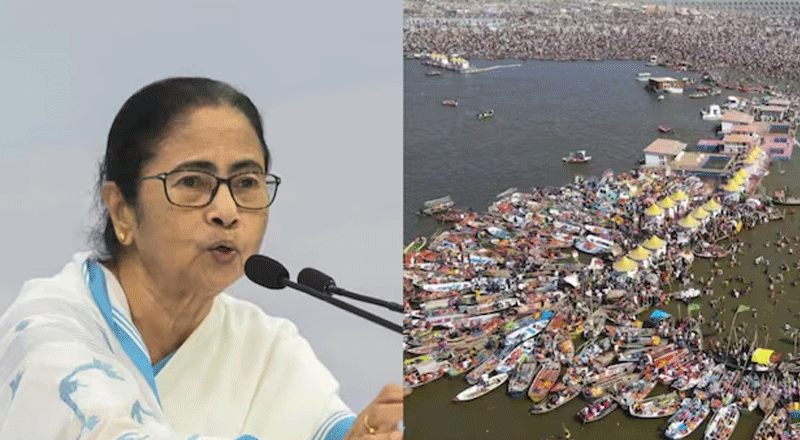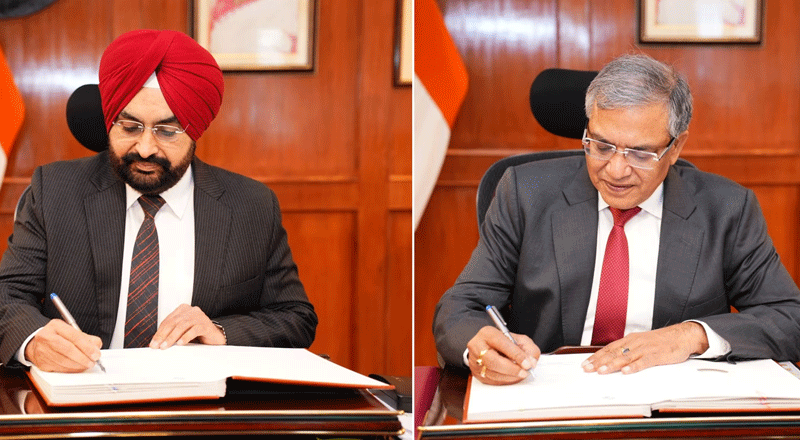The 4th and last Environment and Climate Sustainability Working Group and Environment and Climate Ministers meeting concluded with significant discussions today in Chennai, with consensual adoption of an Outcome document the Chennai High Level Principles for a Sustainable and Resilient Blue/Ocean-based Economy. This document will be submitted to the Leaders for their consideration to be annexed to the G20 New Delhi Leader’s Declaration 2023. The Ministers also adopted the Outcome Document and the Chair’s Summary.
The Ministerial meeting, represented by Shri Bhupender Yadav, Hon’ble Minister of Environment, Forest and Climate Change, was attended by 41 Ministers or their deputies from other countries, and highlighted significant achievements and key takeaways centered around the priority areas under the Environment and Climate track: Land and Biodiversity, Blue Economy, Water Resource Management and Circular Economy. The meeting witnessed proactive engagement from over 225 delegates representing G20 member countries, invitee countries and heads and representatives of 23 International organisations including UNEP, UNFCC, COP28 and UNCCD. The discussions revolved around critical challenges related to matters of climate and environment which are of utmost global importance.
In his video message to the delegates and the Ministers attending the 4th ECSWG and Environment and Climate Ministers meeting, the Hon’ble Prime Minister Shri Narendra Modi, expressed his confidence on the G20 countries joining hands to tackle the climate and environmental challenges in a holistic way in the true spirit of Vasudhaiva Kutumbakam – One Earth, One Family, One Future.
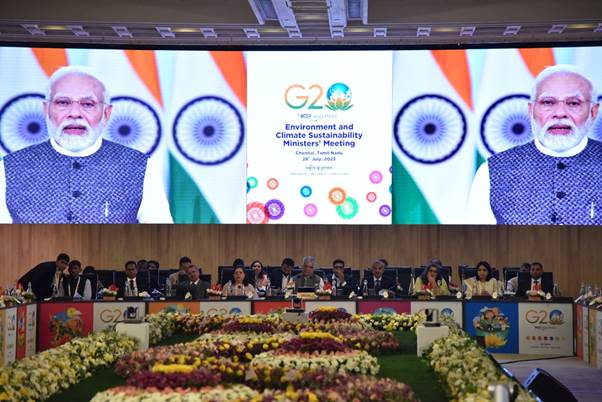
The Prime Minister further emphasised on India’s initiatives being powered by people’s participation. Citing an example of community participation, he mentioned about “Mission Amrit Sarovar” , a unique water conservation initiative more than sixty three thousand water bodies have been built.
The opening address by Shri Bhupender Yadav resonated with the message by the Hon’ble Prime Minister. He applauded ECSWG on the adoption of the High Level Principles. He extended his gratitude towards the efforts made, and encouraged the collaboration among nations in tackling the complex and interconnected challenges of climate change, biodiversity loss, and pollution, fostering a unified approach towards a sustainable and resilient future. He thanked each country for showing an unyielding commitment towards climate action and environmental sustainability, despite its unique challenges and capacities.
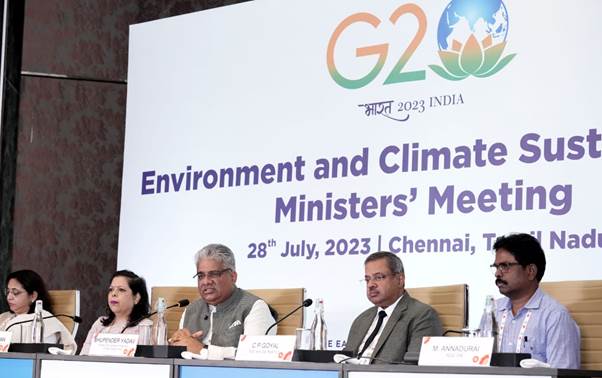
Addressing the Press Conference Shri Bhupender Yadav on the conclusion of the Ministerial meeting said G20 ministers stand united in their commitment to create a sustainable and resilient future. He said India’s G20 Presidency had outlined 3 key themes for the ECSWG:
-
- arresting land degradation, accelerating ecosystem restoration, enriching biodiversity and water resource management,
- promoting a sustainable and climate-resilient blue economy,
- encouraging resource efficiency and circular economy
- Under these themes, the presidency has developed a total of 10 presidency documents and 1 outcome document.
- In the Blue Economy theme, the outcome document on ‘Chennai High Level Principles for a Sustainable and Resilient Blue/Ocean-based Economy’ was adopted by all the G20 members. These 10 principles aim to encourage conservation, protection, and responsible use of ocean resources, while enhancing resilience against climate impacts.
- Under the same theme, 2 Presidency Documents were launched:
- G20 Report on Actions Against Marine Plastic Litter – This report is a rich repository of knowledge about the implemented policies, achievements, challenges, and best practices contributed by 30 countries in their fight against the pressing issue of marine plastic pollution.
-
- Technical Study on Accelerating the Transition to a Sustainable and Resilient Blue Economy – This study identifies various approaches taken by G20 members to the Blue/Ocean-based Economy and identifies measures to foster and facilitate collective G20 members’ action for the preservation and sustainable utilization of ocean resources.
- Under the Arresting Land Degradation, accelerating ecosystem restoration and enriching biodiversity,
- Presidency document on Gandhinagar Implementation Roadmap (GIR) and Gandhinagar Information Platform (GIP) for strengthening the G20 Global Land Initiative was launched. – The roadmap aims to enhance mutual collaboration among participating countries to accelerate ecological/ ecosystem restoration of the Forest fire-impacted areas and mining-affected areas.
- Under the same theme, Presidency also released Compendiums of Best Practices on the following three topics:
- Restoration of Mining Affected Areas – This document is a compilation of knowledge and best practices on ecological restoration of mining affected areas. The compendium covers the best practices, tools and techniques for mining restoration including private sector participation and financing models adopted across the world.
-
- Restoration of Forest Fire Affected Areas – The compendium covers models for planning, prevention, preparedness, response and recovery from forest fires including community initiatives undertaken by countries in this regard.
-
- Water Management – The compendium of best practices on water management will enhance knowledge exchange among G20 countries as well as non G20 countries to conserve water and restore and develop water-related ecosystem through sustainable development approaches.
- Under the theme Resource Efficiency and Circular Economy, 4 Presidency documents were released:
-
- Knowledge Exchange on Circular Economy in Steel Sector – This document highlights four key strategies to transition towards a more sustainable steel sector, which may serve as a blueprint for net zero pathway for the steel industry, reduce resource utilization and utilize wastage.
-
- Knowledge Exchange on Circular Bioeconomy – This document expands on the opportunities, innovations, best practices, and successful interventions, especially related to the utilization of municipal and industrial waste, agricultural residue, and non-food crops from degraded lands, which are vital to the growth of the bioeconomy sector.
-
- Knowledge Exchange on Extended Producer Responsibility for Circular Economy – This document reflects a compilation of the different EPR approaches adopted by various countries, which can be leveraged by policy makers in framing and implementing EPR policies in their respective countries.
-
- Presidency document on Resource Efficiency and Circular Economy Industry Coalition – This document provides the background and context for the establishment of Resource Efficiency and Circular Economy Industry Coalition (RECEIC) under India’s G20 Presidency. It presents a review of the current landscape on circularity including current baselines, the major challenges faced and potential opportunities to increase the adoption of circularity by the industries
Throughout the ECSWG meetings, several side events and excursions were organised. Delegates had the opportunity to explore numerous heritage sites that showcased both tradition and sustainable lifestyles, emphasizing the importance of living in harmony with nature. Notable visits included Bannerghatta National Park, Adlaj Vav, and a UNESCO heritage monument visit at Mahabalipuram.
The Environment and Climate Sustainability Working Group (ECSWG) meetings chaired by Ms. Leena Nandan, G20 ECSWG Chair, Secretary, Ministry of Environment, Forest and Climate Change (MoEFCC) were held in Bengaluru, Gandhinagar, Mumbai and Chennai. The Chennai meeting was the fourth and final ECSWG. Apart from that, numerous bilateral meetings have been held between India and other G20 countries. The ECSWG deliberated and negotiated on priority areas selected by the Indian Presidency, which was cemented by the Environment and Climate Ministers by holding deliberations and adopting the outcome documents related to these priority areas.
All through the ECSWG meetings, many G20 and invitee countries, as well as international organizations actively participated in the preparation of compendiums, technical documents and studies termed as presidency documents under the ECSWG this year. It is promising that the knowledge repositories put together during the course will significantly support countries and organisations in crafting action-oriented frameworks, coalitions, and alliances, and these endeavours will serve the G20 and the rest of the world profoundly during this crucial decade of climate action.
The success of the G20 Environment and Climate Sustainability Working Group’s endeavours stands as a testimony to the collective will and determination of the G20 nations to tackle environmental challenges head-on. As the India Presidency’s term draws to a close, the legacy of this fruitful collaboration will continue to inspire and guide global efforts towards a more sustainable and prosperous world.


